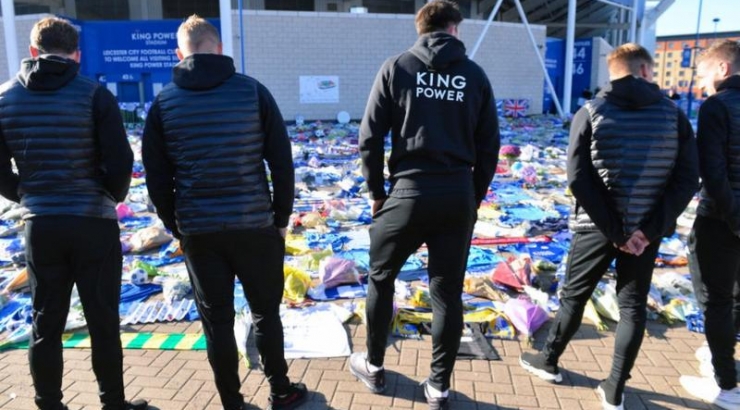
In the wake of the tragedy last weekend which saw Leicester City owner and chairman Vichai Srivaddhanaprabha and four other people die in a helicopter crash outside King Power Stadium, BSports asks if sport can provide healing in times of grief.
Leicester striker Jamie Vardy says the team want to pay tribute to Srivaddhanaprabha when they play against Cardiff City in the Premier League on Saturday.
It will be the first time the Foxes will have taken the field since the crash and Leicester manager Claude Puel gave his squad the option of whether or not to play.
Vardy says each one of them wanted to, so they could "do Srivaddhanaprabha proud on the pitch".
How have different sportsmen and women dealt with competing at the highest level despite losing someone close to them?
BSports 5 live's Friday Sports Panel spoke to long jump gold medallist Greg Rutherford, England netball captain Ama Agbeze and four-time Superbike world champion Jonathan Rea.
Olympic long jump champion Greg Rutherford:
Rutherford's grandfather died just before he flew out to Beijing for his first Olympic Games, in 2008.
He was somebody I was incredibly close to and it was the first person I'd ever experienced pass away in my direct family. I think I was very lucky to have a granddad until I was 21.
But when he died, it hit me incredibly hard, so I then left for Beijing, to train and get ready for that. But physiologically, it really did affect me and I started doing really odd things during the competition.
I started having this strange belief system that something so bad had happened to me, that now all of sudden something really good is going to happen. So I'm now going to go to the Beijing Olympics, I'm going to compete, and it's all going to go great.
Funnily enough, qualification went incredibly well, but actually with the stress, the lack of sleep, and everything else that I'd been experiencing, I woke up for the final and - little did I know how bad it was at that time - but I basically contracted tonsillitis, a kidney infection, and bronchitis.
People talk about the air quality, but actually I think a big part of it was that I was so emotionally drained, so exhausted, that all these things managed to get in, and basically I changed everything I was normally doing in a competition, just because of what had happened.
Then the worst thing happened - I finished 10th after it all went incredibly wrong for me in the final. And then you think 'well, what on earth was the point of me even going to this Olympic Games?', because I missed the funeral, I wasn't around my family at the time.
I was dealing with it very poorly, and I felt that all I had done was waste about three or four weeks of my life - it was very hard to get my head around it.
England netball captain Ama Agbeze:
Just before the 2015 Netball World Cup, the father of England coach Tracey Neville died. Neville Neville had travelled to Australia for the competition, where Agbeze was a travelling reserve with the squad.
It was in Sydney and he travelled out and was taken to hospital. It obviously significantly affected Tracey, and that had a knock-on effect on the support team and the team themselves. And that was really difficult. They ended up with a bronze medal, so it was credit to her, and Tracey stayed around and dealt with the issues after the World Cup.
Agbeze also had a difficult personal decision to make before the Commonwealth Games in April this year, when her husband's best friend passed away.
It's quite difficult being in a team situation, because you're not just there for yourself, you're there for the team, and obviously I'm the captain. It was in the build-up to the Commonwealth Games, so the Games hadn't actually started, but there was talk of me not going, to be there in New Zealand [where she lived with her husband].
I did go for about two days to support my husband. I think it's a really difficult situation, because it's not our direct family, but the way things are in New Zealand, your close friends are treated as your family.
So I think it was difficult for the management to understand that it was, in effect, my family. And the leadership group supported me, and said I should go. And I think it was really important that I went for my husband, not necessarily just for me.
Four-time Superbike world champion Jonathan Rea:
Jonathan Rea's close friend Craig Jones died in 2008 after a crash during a race they were both competing in.
He was a few places behind me and we were racing bar to bar for the race win that weekend. As soon as the race got red-flagged, I was a little bit frustrated because I was leading the race, and as soon as I heard the news that Craig had died, it was horrible.
That tragedy was very close to home for me, and was very sad, because I was very close to him and his family.
But there's something in the back of your brain, that you feel it's never going to be you. You face it in any sport, with injuries, and you see people have career-ending injuries, or much worse, and you kind of have that mentality that you think it's not going to be you, because of whatever reasons.
Whether it be the fans, or the people who take part in the sport, or media in general - everybody stands together.
It was incredible to see how many well-wishers Craig had. Everyone standing together gave you more power to go out and give a good performance, and I'm sure the Leicester City players and fans are going to put on a great show this weekend.






